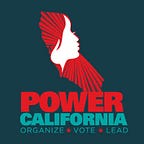Dr. King’s Law: Human Freedom Across Borders
Victor L. Cyrus-Franklin serves as a pastoral associate at Holman United Methodist Church in Los Angeles. He is a native of Nashville, TN.
“I see God working in this period of the 20th century in a way that (people) in some strange way are responding….The masses of people are rising up wherever they are assembled today. Whether they are in Johannesburg, South Africa, Nairobi, Kenya, Accra, Ghana, New York City, Atlanta, GA, Jackson, MS or Memphis, TN, the cry is always the same, ‘We Want to be Free.’ ” — Dr. Martin Luther King, Jr., “I’ve Been to the Mountaintop,” April 3, 1968
As a child of the Black Church in the American South, it was commonplace for me to hear the stories of Black freedom fighters like Rosa Parks, Medgar Evers and Sojourner Truth. Though they were legally regarded as second class citizens in this country, they appealed to a higher law, the law of equality in God, to stand boldly for the just treatment and freedom for their people. I also learned of leaders like Marcus Mosiah Garvey and Shirley Chisholm, first and second generation Black immigrants to the US who challenged and fought against laws that denied human freedom. Early in life, I learned that anti-Black and anti-immigrant sentiments were interconnected. Whether descendants of the enslaved in the US or the colonized around the world, we are part of a shared struggle for human freedom and liberation. On this 53rd Anniversary of Dr. Martin Luther King, Jr.’s letter from the Birmingham Jail, it is important for us to remember that Dr. King understood the same.
On 12 April 1963, eight white clergymen (including four bishops, a rabbi and local church pastors) published a public statement in several Birmingham newspapers appealing for Black citizens in Alabama to forfeit efforts to protest the injustice of legalized racial segregation in the streets, but to abide by “Law and Order and Common Sense.” While they acknowledged “racial problems” in Birmingham, until the laws were changed through the courts, these clergymen argued that the courts’ decisions should be “peacefully obeyed.” Ironically enough, while protesters were beaten, jailed and publicly demeaned for their peaceful disobedience, the local news media and law enforcement were commended for their “calm manner” and “restraint.” For these clergymen, conversation alone was sufficient.
Four days later, writing from prison, Dr. Martin Luther King, Jr. responded publicly to his fellow clergymen, arguing that while it was legitimate to have anxiety about the willingness to break the law, unjust laws “do not square with the moral law or the law of God,” and are codes that majorities inflict on minorities which degrade humanity as a whole. Just laws “uplift human personality.” Moderation in the face of injustice, then, only serves to enable the ongoing degradation of humankind. Human progress comes through struggle. While the courts are important, the struggle for freedom from unjust laws is not just for attorneys and lawmakers, but for every person who believes in the uplift of human personality.
Dr. King’s letter from the Birmingham Jail was part of a struggle to challenge and build solidarities with white moderates who may have been sympathetic to the plight of Black people in Birmingham, but whose solidarities upheld the privileges of white supremacy. Indeed this was and continues to be an ongoing and international struggle. Dr. King indicated as much in the letter when he connected the Birmingham struggle to Asian and African movements for national independence from European colonialism.
Slavery established systems and institutions designed for the very purpose of exploiting one group of people for the benefit of another group. And colonialism continued along this same path. In a neo-colonial world, where race and class insecurity create fear of immigrants, refugees, and people of color, the courts remain a battleground for human rights, but as in Birmingham in 1963, the struggle isn’t in the courts only.
Today, the US Supreme Court will hear arguments on the Deferred Action for Childhood Arrivals (DACA) initiative and the Deferred Action for Parents of Americans and Lawful Permanent Residents (DAPA) initiative. The Fifth Circuit court’s decision to disregard executive authority and discretion has deep roots in white racial insecurity and I believe Dr. King would join with organizers today to challenge unjust laws and decisions that attempt to degrade the humanity of oppressors and the oppressed alike. Care, concern and justice for all families should be core to any decision the courts make, but as we work for the Supreme Court to reverse the Fifth Circuit’s ruling, like Dr. King, we must also stay in the streets. We must move beyond conversation to ongoing collective action.
